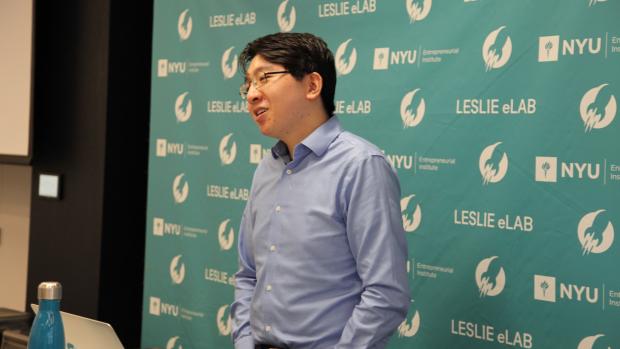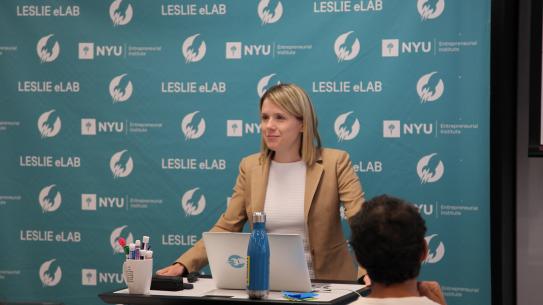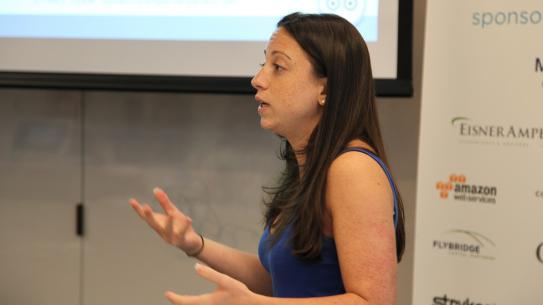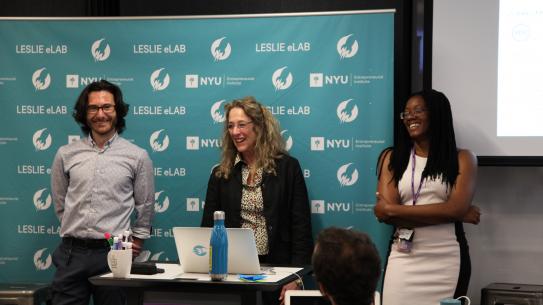The Finish Line is Just the Beginning at the NYU Summer Faculty Startup Sprint

NYU Tandon Post Doctoral Associate, Thomas Yu, speaking about H2POWdr, a hydrogen producing nanomaterial
Not even a month after meeting for the first time, participants in the inaugural Summer 2018 Faculty Startup Sprint met to pitch their products, services, and applications to NYU business advisors. Organized by the NYU Tandon Convergence of Innovation and Entrepreneurship (CIE) Institute directed by Professor Jin Montclare, NYU Entrepreneurial Institute (NYU EI) and supported by the National Science Foundation I-Corps Sites Program, which also support the J-Term Sprint, Student Summer Startup Sprint and Summer Accelerator program, the Faculty Startup Sprint is open to faculty entrepreneurs from NYU’s many schools, and encourages collaboration between disciplines. Like the previous Sprints from the CIE Institute, the Faculty Startup Sprint encourages participants to survey potential clients, customers and/or users, speak to business advisors, and chisel out a basic business plan for a startup.
Participating in this year’s faculty sprint, the first of its kind, were NYU Tandon Post Doctoral Associate Thomas Yu and NYU Tandon Ph.D. Candidate Daniel Frey, both from NYU Tandon School of Engineering. Together, with help from advisor and professor Miguel Modestino, as well as undergraduate Brian Chen, they created H2POWdr, a hydrogen producing nanomaterial. The nanomaterial has the potential to improve fuel cells, giving them enhanced energy and power density. The material has additional potential as an oil recovering agent at extraction wells with declining performance, and as a water purification and desalination agent.
Thomas Yu explained that having prototyped a reactor, the H2POWdr team was seeking guidance not only on how to iterate and improve on their product, but how to best market and fund it. He was given 10 minutes to present H2POWdr, and received encouraging, but honest, feedback from two instructors from the NYU EI and partners with the CIE Institute, Rebecca Silver and Frank Rimalovski, who have coached the teams since the sprint’s inception.
Another team, staRt, pitched their speech therapy app. Tara McAllister of NYU Steinhardt, along like Mario Svirsky of NYU Langone and Tae Hong Park of NYU Steinhardt, developed the app to help speech therapists eliminate their young clients’ speech errors using visual/acoustic feedback. After vigorously user-testing during the Faculty Startup Sprint, the team found that the app was missing some key features, like the ability to customize word lists for speech therapy students with particularly troublesome words. According to McAllister, most speech therapists who used the app during user testing said that “R” words and sounds (which the app focuses on) are of particular concern to them. “The only speech pathologist who said “R” wasn’t a problem was based in Boston,” McAllister noted, receiving a chuckle from the rest of the sprint participants and advisors.
Pi-Radio is a transceiver radio startup composed of faculty from Tandon, including Sundeep Rangan, NYU Tandon Professor of Electrical Engineering, Marco Mezzavilla, NYU Ph.D. student and research assistant in Telecommunications Engineering, Aditya Dhananjay, now a NYU Postdoc in Computer Science, James F. Buckwalter, Professor of Electrical Engineering at UCSB, Dennis Shasha, NYU Professor in Computer Science. The startup’s fully digital radios can be integrated into smartphones and cars, and transmit and receive radio that leads to lower data rates and better connections. After interviewing 52 potential users, Pi-Radio found that research labs could be excellent early adopters of their products, but other markets are not off the table, considering that Pi-Radio has the potential to adapt to and improve cellular services, future wifi services, and AR/VR. Thanks to the research done through the Faculty Startup Sprint, Pi-Radio now has the resources to determine which market would be most appropriate for their product.
Woken, a Startup Sprint team made of faculty members from Stern School of Business and Courant, also built an application for young people. Theirs focuses on recent grads who have recently entered the job market for the first time, and may not have the tools to enter the often-daunting world of the job hunt. Though it started out as a career management platform to help new grads figure out their career path, after the 47 potential users interviews conducted during the Startup Sprint, Woken decided to focus on developing a career exploration platform that helps recent grads and current students identify fields that they will find personally and professionally rewarding.
Many of the teams that presented plan to go forward with their startups, implementing more user-testing, expanding their teams, and attending conferences related to their products in order to explore the competition and speak to potential investors.
The 2018 Faculty Startup Sprint is made possible by the generous support of National Science Foundation, grant number IIP-1644681.




